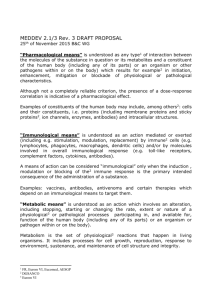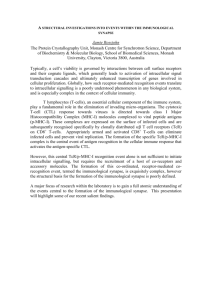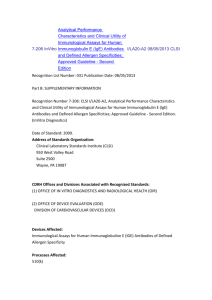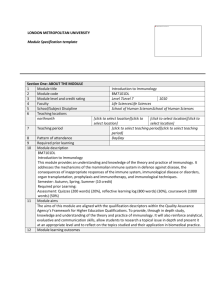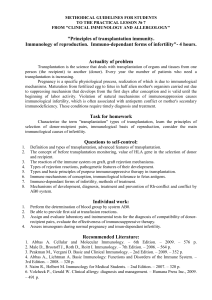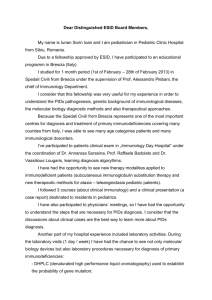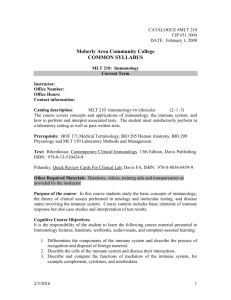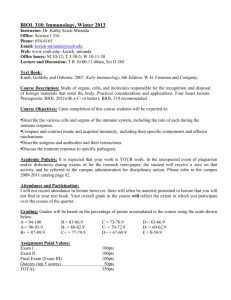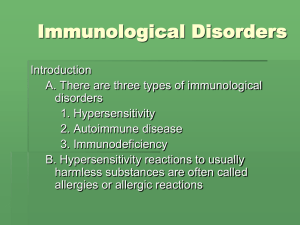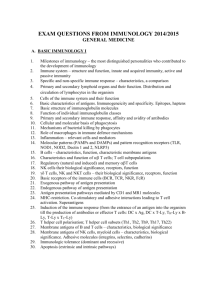STANDARD COURSE SYLLABUS for academic year 2014/2015
advertisement
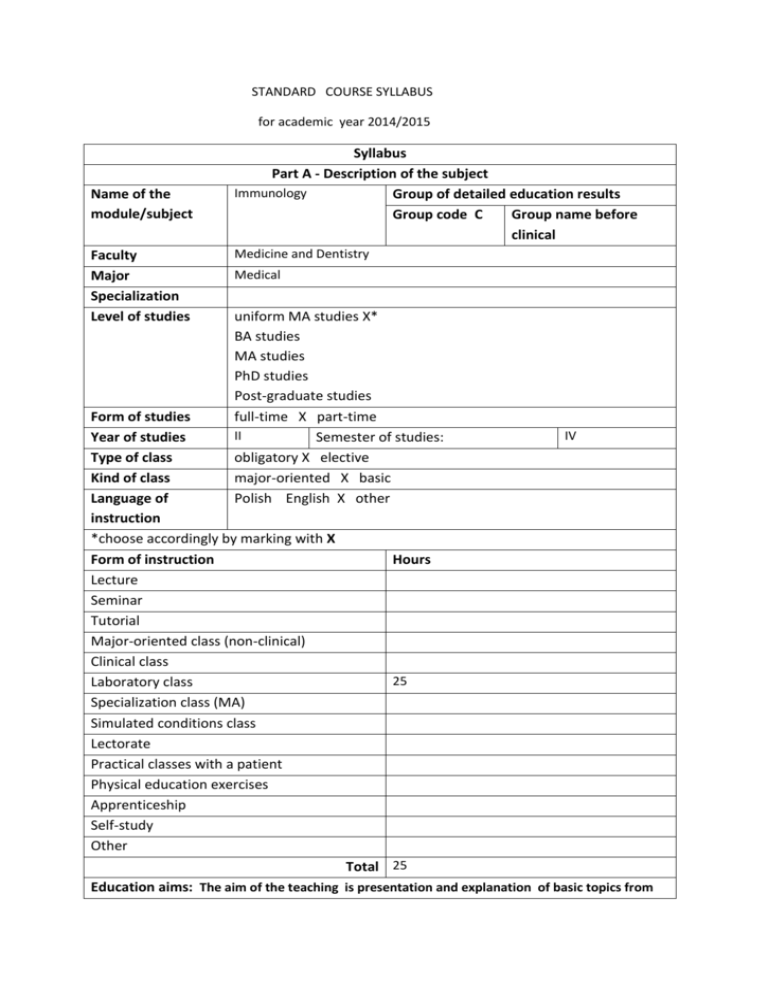
STANDARD COURSE SYLLABUS for academic year 2014/2015 Name of the module/subject Faculty Major Specialization Level of studies Syllabus Part A - Description of the subject Immunology Group of detailed education results Group code C Group name before clinical Medicine and Dentistry Medical uniform MA studies X* BA studies MA studies PhD studies Post-graduate studies full-time X part-time II Semester of studies: obligatory X elective major-oriented X basic Polish English X other Form of studies Year of studies Type of class Kind of class Language of instruction *choose accordingly by marking with X Form of instruction Lecture Seminar Tutorial Major-oriented class (non-clinical) Clinical class Laboratory class Specialization class (MA) Simulated conditions class Lectorate Practical classes with a patient Physical education exercises Apprenticeship Self-study Other IV Hours 25 Total 25 Education aims: The aim of the teaching is presentation and explanation of basic topics from immunology including: ontogenesis of the immune system, the role of antigens and humoral antibodies in innate and adoptive immune response, regulations of the immune response, the goals of immunotherapy and immunomodulation the role of hypersensitivity, the pathomechanisms of autoimmune disease and primary and secondary immunodeficiency The methods of verifying the intended education results and the form of class in the context of the matrix of education results for module/subject: Student who completes the module/subject will know/be able to: Methods of verifying whether Type of class the intended education results have been achieved ** enter (forming and summarizing) symbol C.W7 the student knows the structures of immunological system, colloquium, open questions after 3 meetings , finally, test consist of 20 questions C.W8 is able to define the innate and adoptive immunity, know mechanisms of hypersensitivity and autoimmunity C.W10 can describe the basic of immunodiagnostic procedure and immunomodulations of immunological response C.W11 know pathomechanisms of allergic and autoimmune diseases, primary and secondary immunodeficiency C. U2 - the student can perform No. of the education result LC immunoenzymatic test and explain different immunological results associated with activity of immune system - describe the level of immunological reaction C.U3 - is able to choose proper diagnostic immunological procedure C.U4 - the student is able to explain dysfunction of immunological system led to development of disease C. K 1 -the student is able to cooperate in the group during the laboratory practice - knows how to prepare an oral seminar presentation - can present immunological topic chosen by himself during seminar - is able to collect references for immunological topics. ** L - lecture; S - seminar; T - tutorial; MC - major-oriented classes (non-clinical); CC - clinical classes; LC - laboratory classes; SC – specialization classes (MA); SC - simulated conditions classes; LE - lectorate; P - practical classes with a patient; PE - physical education classes (obligatory); A - apprenticeship; SS - self-study Please mark with pluses (scale 1-3) how the abovementioned effects place your module/subject in the sections: passing on knowledge, skills or forming behaviors, e.g.: Knowledge +++ Skills +++ Behaviors ++ Student's work input (ECTS points): Type of student's work Student's workload (h) (participating in class, activity, preparation, tests etc.) 20 1. Hours on-site 44.5 2. Own work 64.5 Summary of the student's workload 2 ECTS points per module/subject Remarks Subject of class: (enter the topic of each class, including the division for the type of class; remember the topic of class has to translate into intended education results) Lectures 1. 2. 3. Seminars 1. Development of immune system. 2. Innate and adaptive immune response. 3. Regulation of immunological response 4. Immunomodulation (activation, suppression) of immunological response. 5. Autoimmunity and autoimmune disease 6. Hypersensitivity (types I, II, III, IV) 7. Primary and secondary immunodeficieny Classes Laboratory 1 Types of biological materials Storage and stability (biological materials, antibodies) Laboratory 2 Techniques used in immunological practice Detection of antigens using immunofluorescence technique. Estimation of immunological results Laboratory 3 Immunoenzymatic methods Detection of antigens using ABC method Fluorescence in situ hybridization (FISH) Laboratory 4 Estimation of immunological specimens, analysis of immunohistochemical results Monoclonal antibodies in immunological diagnosis Laborotroy 5 Completion of the subject - test Other 1. 2. 3. etc…. Basic sources: (list according to significance, no more than 3 items) 1. D.Male, J. Brostoff, D.B. Roth. I. Roitt. „Immunology”-2011 year 2. J.K. Actor.” Immunology and microbiology. 2012 year Additional sources and other resources: (no more than 3 items) 1. 2. 3. Requirements for teaching resources: (e.g. laboratory, projector, other...) Entry requirements: (the minimum conditions the student has to meet prior to entering the module/class) Conditions for completing the course: (what are the terms and conditions of obtaining credits from particular classes within the module/subject, the terms and conditions of being allowed to take the final exam, the terms and conditions for passing the final exam, the requirements for particular grades) Grade: Very good (5.0) Good plus (4.5) Good (4.0) Sufficiently good (3.5) Sufficient (3.0) Grading criteria: (only for subjects/modules ending with an exam) Name and address of unit conducting course, contact information (tel./email): Department of Immunopathology and Molecular Biology julia.bar@umed.wroc.pl ……… Person responsible for the course for a given year prof. dr hab. Julia Bar ………………………………………………………………………………………………………………..……………………………… Signature of head of unit conducting the course Signatur Julia Bar Date of syllabus drafting: …15.10. .2014…………………………………………

